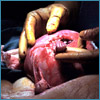| The Future of Human Cell Biotechnology |
The therapeutic value of embryonic stem cell research, always questionable, is being obsoleted by recent and rapid advances in human therapies as well as animal trials using adult stem cells.
- The current support of ESCR as a therapeutic tool by the scientific community, based primarily on "respect for science" attitudes, will erode to insignificance within about 2 years.
- Continuing research in human embryo development - valuable in its own right - will continue, but at a less hyper-public level using the existing lines already defined and other sources such as umbilical cord blood and adult stem cells, essentially using petri dish embryos as laboratory animals.
- The support for "therapeutic" cloning, which is based primarily on the need for compatible stem cells, will also disappear for the same reasons.
- Opposition to any support for "reproductive" cloning will continue for the foreseeable future in the legitimate research community.
Further research on adult stem cells will expand and will also shift from the current in vitro processes to finding the in vivo processes which allow in vivo stem cells to find problem areas in the human body and to differentiate themselves to the appropriate cells.
The practice of in vitro fertilization will expand (and in many cases is already expanding) beyond the existing market of couples with fertility problems to:
- first, couples with known or suspected hereditary genetic defects, such as Tay-Sachs or ALS
- second, couples in their late 30s or 40s without known fertility problems who want to assure, via PGD, a non-handicapped child.
- third, the homosexual and lesbian community
- fourth, wealthy couples who want to enhance the capabilities of their child via genetic engineering
- fifth, and most potentially disastrous, public health agencies with grand illusions of a better world
In vitro fertilization will improve its efficiency in terms of lowering the ratios of embryos extracted/ fertilized/ implanted, ultimately (5 to 10 years?) to 1/1.
IVF institutions will continue to function with few societal controls and will continue to conduct genetic engineering research experiments on embryos with the relatively uninformed consent of the parents.
- The lack of follow-up studies on IVF-conceived children is already showing unexpected problems
- The lack of controls allows IVF clinics to operate using unsafe practices
- The uncontrolled use of genetic engineering in these clinics could lead to disastrous consequences to individuals, families, and society.
1. Human embryonic stem cell research and cloning will fade in favor of adult stem cells
2. In vitro fertilization and associated genetic engineering processes will expand and become a major ethical battleground
In short we are fighting the wrong battles with stem cells and cloning. The real problem is in vitro fertilization.
|





